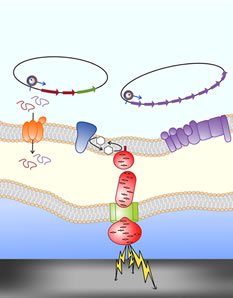Scientific Achievement

A few specialized bacteria contain electron transfer protein complexes – electron nanoconduits – that allow them to reduce or oxidize an electrode. By exploring factors that control the synthesis of these electron nanoconduits, the model microbe Escherichia coli was engineered to deliver current to an electrode.
Significance and Impact
This work identifies conditions that allow for this electron transport system to be synthesized and function as electrical interface in non-native cell types. These cells can then interact directly with electronics, offering enormous potential for bioenergy, biosensing, and biocomputing applications.
Research Details
- Provides controllable and improved synthesis and function of the MtrCAB pathway by use of a more tunable promoter system allowing any E. coli to express this system and communicate with electronic devices.
- Using high-throughput plate screening, generated library of strains with varied expression levels of the pathway to identify protein expression levels which result in the highest current produced at the anode.

